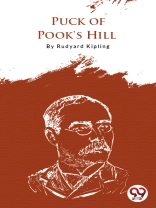Puck of Pook's Hill is a short stories composition written by Rudyard Kipling. The composition of these fantasy stories, was first published, in 1906. In these short stories Puck, a magical Faun narrates British history, covering different periods to two children Dan and his sister Una. Pucks magic is amazing, he brings fantasy and history into the children's everyday world. He introduces characters from English history, Roman cavalier, old Christian pagan Gods and various other stories about Vikings, pirates, killer apes, smugglers fairies etc. Through his breadth of imagination author narrates beauty, comedy and tragedy of life. He also gives a vivid picture of war, politics, adventure, clash of conquerors and settlers of the region. Kipling depicts in these stories that honour is more important than pride and loyalty more important than gain. He says good craftsmanship, valour and daring spirit are valued. These stories are interspersed with beautiful poems composed by Kipling. By these stories Kipling inspires the youths to think for their motherland and show their love and respect.
Rudyard Kipling
Puck of Pook’s Hill [EPUB ebook]
Puck of Pook’s Hill [EPUB ebook]
Купите эту электронную книгу и получите еще одну БЕСПЛАТНО!
язык английский ● Формат EPUB ● ISBN 9789356560505 ● Размер файла 0.6 MB ● издатель Double 9 Books ● опубликованный 2022 ● Загружаемые 24 месяцы ● валюта EUR ● Код товара 8866844 ● Защита от копирования Adobe DRM
Требуется устройство для чтения электронных книг с поддержкой DRM












